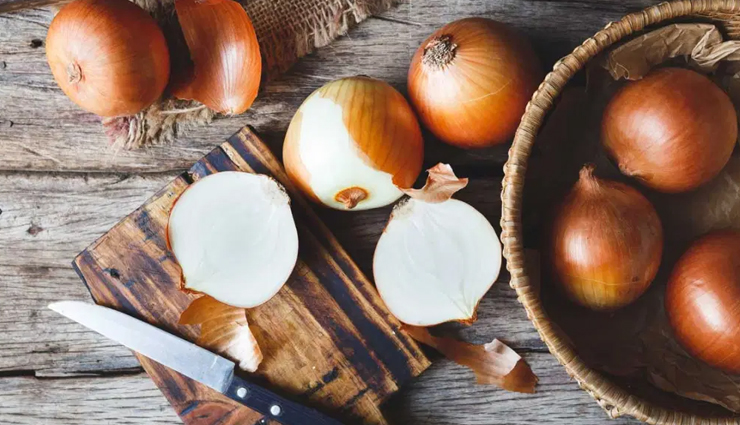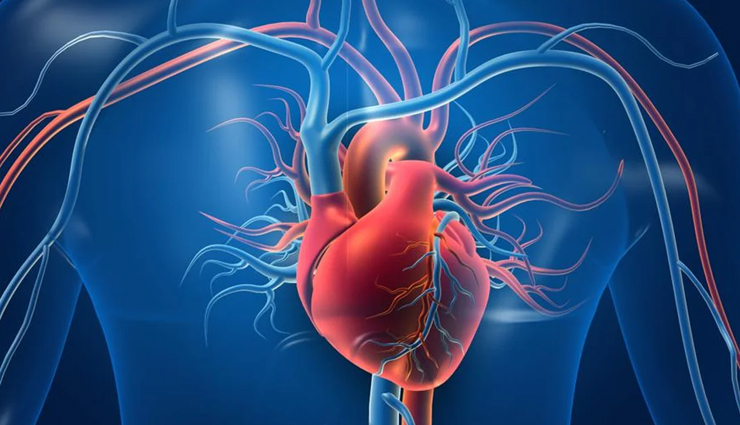- Home›
- Healthy Living›
- 6 Potential Health Benefits Of Onions
6 Potential Health Benefits Of Onions
By: Kratika Tue, 15 Mar 2022 11:58:29

Onions ‘Pyaz’ have layers of research based health benefits and are packed with nutrients, vitamins, antioxidants, and minerals. Onion also referred to as the bulb onion is a vegetable (or fruit… the debate rages on) that forms an essential ingredient in Indian cuisines.
Scientifically, onions are called Allium cepa. In Hindi, they are known as Pyaz or Kanda. Onions can be consumed either raw, dried, or cooked. Onions offer a strong taste and a pungent flavour. They grow underground as bulbs.
The onion plant has bluish-green leaves, and the bulb is at the base which begins to swell after a fixed period. There are several different types of Onions available, they are yellow onions, sweet onions, white onions, red onions, shallots, green onions and leeks.
Onions are famous for making people cry when they are chopped. This tear-inducing effect is attributed to the enzyme reactions which triggers the release of a gas that irritates the lacrimal glands producing tears for the eyes. Onions are rich with several vitamins, antioxidants, and minerals. Consumption of onions offers numerous health benefits.

# Prevents cancer
1. The sulfur compounds and flavonoid antioxidants present in onions possess the cancer-fighting properties.
2. The diallyl trisulfide compound present in onion regulates several pathways linked with cancer development. They comprise of provoking the cancer cells to kill themselves, preventing the spread of cancer cells, and induces programmed cell death.
3. Quercetin compound present in onion is an effective anti-cancer agent that restricts cancer cells in certain cancers such as colon, breast, prostate, lung, ovarian, and endometrial.
4. The high content of quercetin in onions helps in decreasing inflammation and is effective in both, treatment and prevention of cancer.
5. Quercetin and S-allylmercaptocysteine compound of onion prevents the spread of cancer cells.
6. Fisetin and quercetin content of onion prevents the growth of tumors.
7. Onionin A, a sulfur-containing compound of onion reduces tumour development and slows the spread of lung and ovarian cancers.
8. Compounds of onion are known to reduce the risk of certain types of cancers such as breast, stomach, colorectal, oral, laryngeal, and oesophageal.

# Boosts digestive health
1. Onions possess a high content of fiber and prebiotic, which are essential for optimal gut health.
2. Inulin, a type of fiber and fructooligosaccharides present in onion acts as a prebiotic. Prebiotic help in boosting the number of friendly microbes which boosts the digestive health and enhances bacterial balance in the gut.
3. Inulin content of onion also helps in boosting nutrient absorption and preventing constipation.
4. Oligofructose, another soluble fiber found in onions is known to treat and prevent different types of diarrhoea.
5. The phytochemicals present in onions reduces the risk of gastric ulcers.
6. The natural prebiotic present in onions is known to treat pain in the stomach and stomach worms.

# Regulates blood sugar
1. Certain compounds such as quercetin and sulfur present in onions possess anti-diabetic effects.
2. The sulfur content triggers increased insulin production thus, reducing blood sugar.
3. The quercetin content interacts with the cells in the pancreas, small intestine, fat tissue, skeletal muscle, and liver to regulate whole-body blood sugar levels.
4. Biotin and chromium content of onion enhances regulation of blood sugar levels and also reduces insulin resistance. Biotin treats symptoms linked with type 2 diabetes.
5. Polyphenols content of onions play a major role in glycemic control.

# Maintains bone health
1. Onions are known to decrease oxidative stress, accelerate antioxidant levels, and reduce bone loss thus, preventing osteoporosis and boosting bone density.
2. Quercetin content in onions, restricts the activity of histamines, prostaglandins, and leukotrienes thus, reducing chances of inflammation in rheumatoid arthritis and osteoarthritis.
3. White onions contain a compound known as GPCS, which decreases bone loss.
4. Consumption of onion helps in enhancing bone mineral density, treating joint pains, preventing bone deterioration, increasing bone mass, and reducing bone loss in postmenopausal women.

# Fights heart disease
1. The allyl sulphides present in onions prevents heart disease.
2. The antioxidant and anti-inflammatory properties of Quercetin present in onions reduce inflammation and blood pressure. It also decreases the risk of heart attacks and stroke by averting plaque build-up in arteries.
3. Thiosulfinates present in onions act as a natural blood thinner, preventing blood platelets from clotting thus, reducing the risk of stroke and heart attack.
4. The vitamin C, fibre and potassium content of onion play a role in enhancing heart health.
5. The antioxidants in onions decrease cholesterol and triglyceride levels. Raw onions promote the production of good cholesterol.

# Improves immune system
1. The high content of vitamin C and phytochemical in onions strengthens the immune systems.
2. Vitamin C is an essential vitamin required to make collagen. Collagen is responsible for immunity support and wound healing.
3. Selenium present in onion helps stimulate the immune function. It also averts excessive immune response.
4. The polyphenols in onions protect the body against free radicals. Removal of free radicals encourages a strong immune system.





